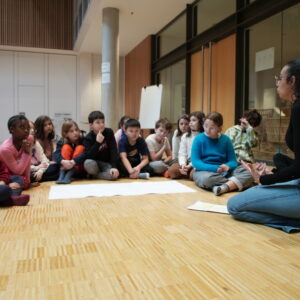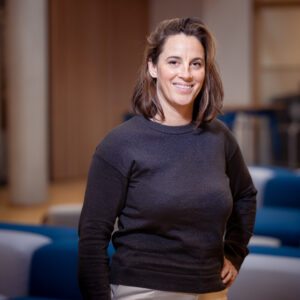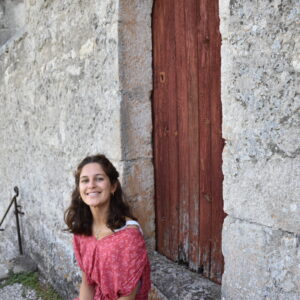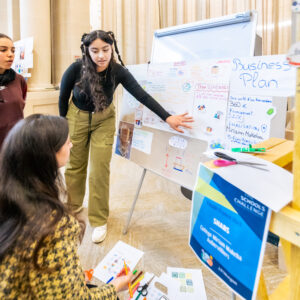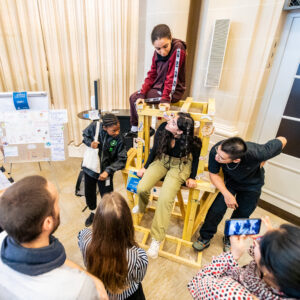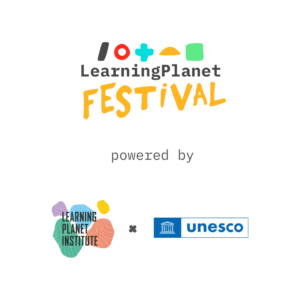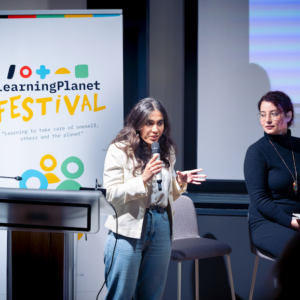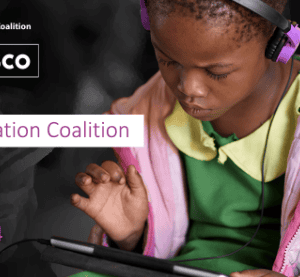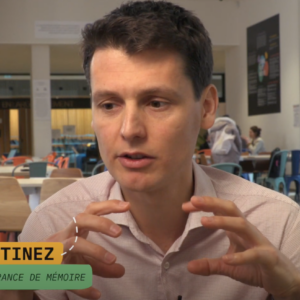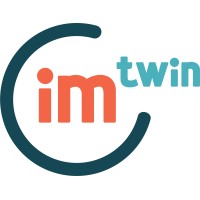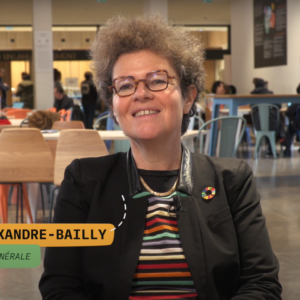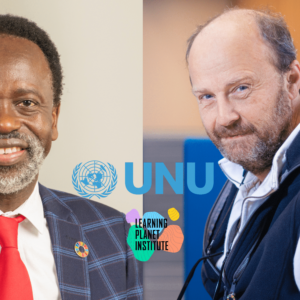After studying engineering in Germany, Maria Luisa Serrano became interested in educational technology (or EdTech) and completed her AIRE Master’s programme in Learning Sciences at the Learning Planet Institute. It was at this point that she joined the HOME student club, whose mission is to share and discuss what students have learnt at the Learning Planet Institute in developing countries. Read on to hear what Maria has been up to since her time at the Institute.
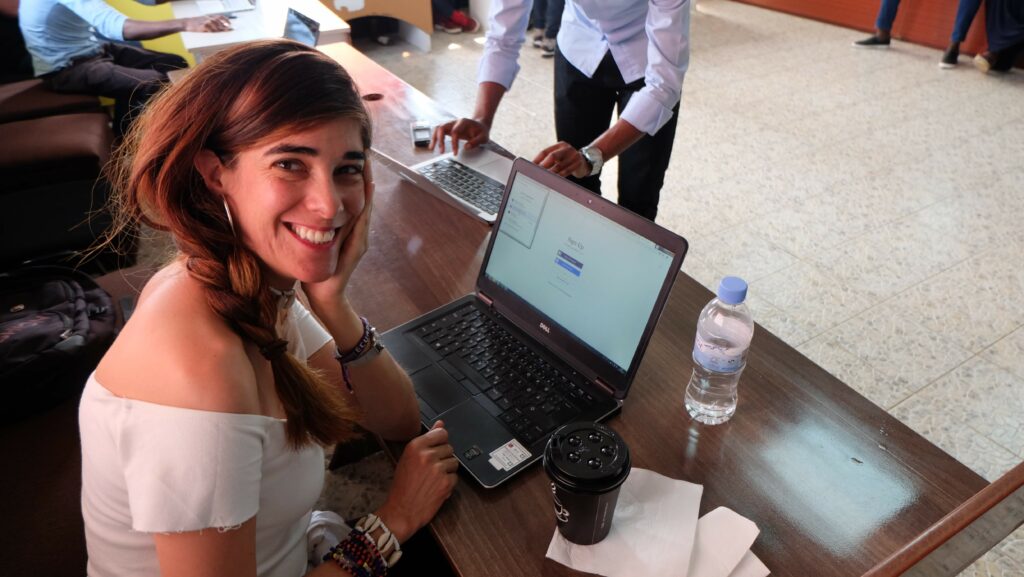
Maria Luisa Serrano arrives happily at the Learning Planet Institute on an afternoon at the end of May. She is delighted to be returning to the institution that welcomed her four years ago. « This place is really great, it brings back good memories, » she smiles.
Maria Luisa was born in Quito, Ecuador. She went to the German school there to study engineering. « My father is an engineer, » she says, « and in South America you have to study something ‘serious’ if you want to find job opportunities.«
She flew to Germany to study mechanical engineering at the Technical University of Darmstadt. « I still had a bit of a culture shock when I arrived from Ecuador. I thought the people were very serious. The South Americans were cooler and thought a lot about partying. » she says.
After her studies, Maria Luisa worked at Festo Didactic, an EdTech company that uses – among other things – bionic robots for learning. « These are mechanical solutions that make it possible to learn from nature. The idea behind Festo is really to find solutions inspired by nature.«
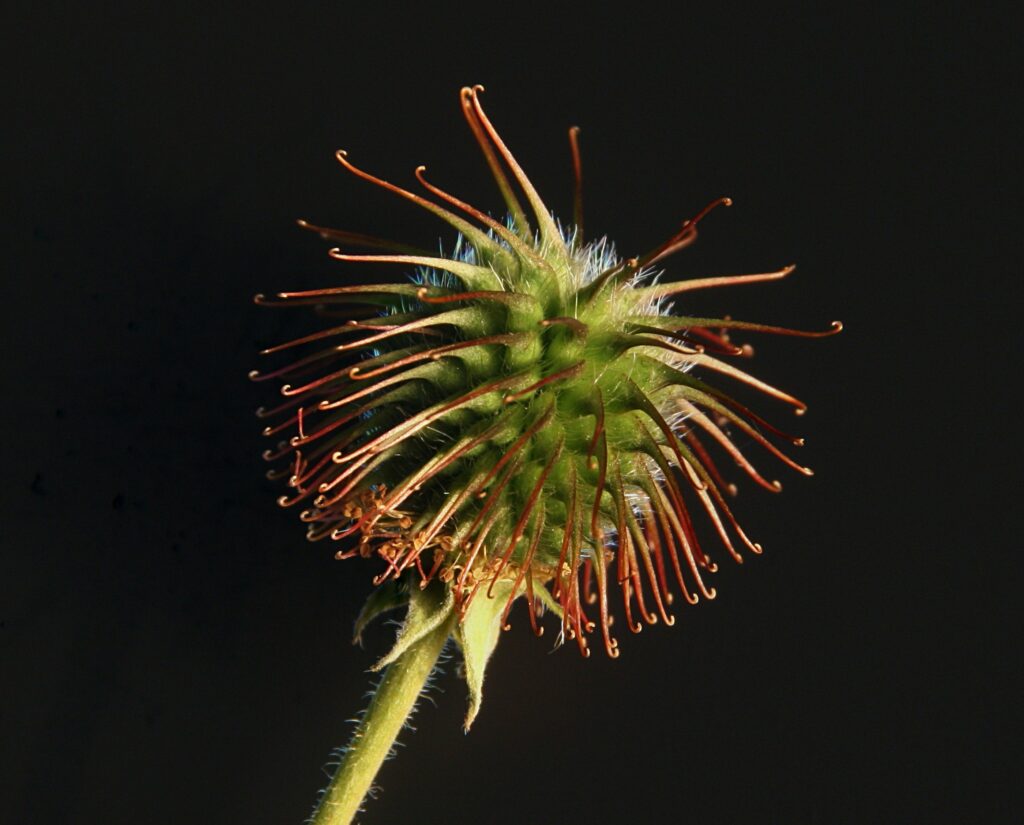
At the time, Maria Luisa’s role was that of coordinator, working to improve technical solutions for education in the various countries for which she was responsible. « I worked mainly for the South American market. I was in contact with the Ministries of Education and Industry. We were looking for new development opportunities, new suppliers and new partners to develop our learning robots. It was a job that looked to the future, to transform education« . It made all the more sense to Maria Luisa as South America had more gaps in this area than certain European countries, such as Germany or France.
It was during this first experience that I discovered that technology and education could intersect, and I wanted to further explore the subject.
After a highly technical career, Maria Luisa wanted to develop her pedagogical skills. On the internet, she searched for a degree combining education and technology, and came across the Learning Planet Institute. « I wanted to learn more, to have a better knowledge of social sciences, macroeconomics… I needed to broaden my range of skills. » So she went straight into the Master 2 programme in Learning Sciences.
Maria Luisa’s arrival in Paris went rather smoothly, despite her preconceived opinions: « I admit I was a little anxious. I thought it was an expensive, snobbish city, where people were always complaining. » In the end, Maria Luisa enjoyed her Parisian life. « I often went to vernissages, exhibitions and to the cinema. I really enjoyed the third places, like Les Grands Voisins, which combine social encounters, social innovation and cultural events. It’s dynamic and there are lots of communities. It wasn’t what I was expecting, and I enjoyed everything Paris had to offer.
Maria Luisa has also made the most of her studies at the Learning Planet Institute through forging strong links with the people she met there. « For me, the most interesting part was the people, » she says with a twinkle in her eye. « All the people came from different countries, had different backgrounds and were very open-minded. It was a pleasure to be there.«
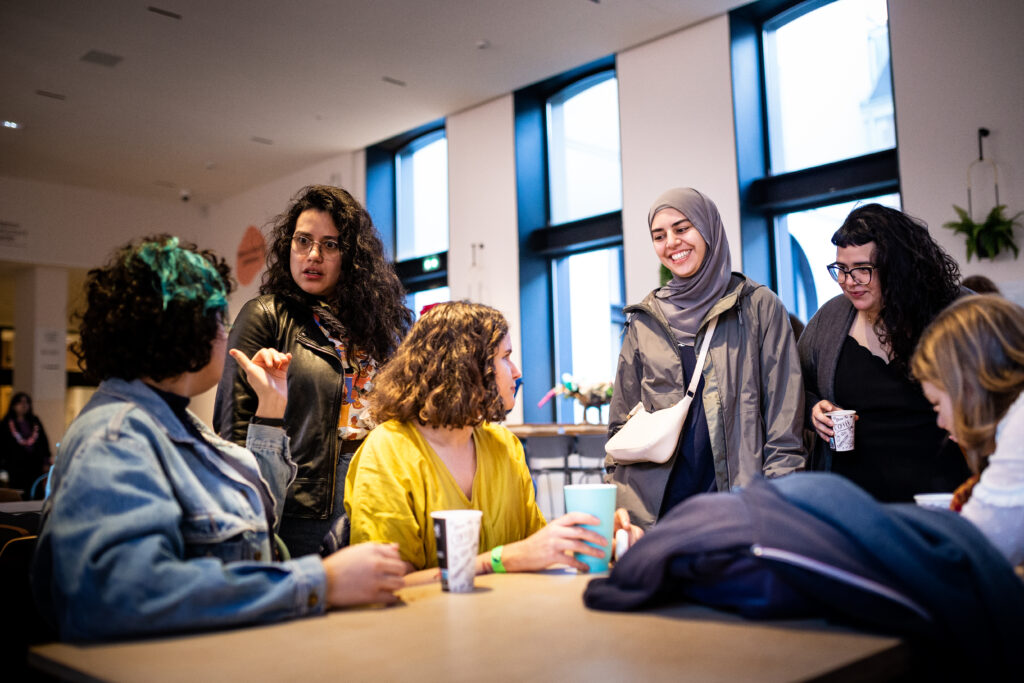
She and her fellow students are involved in a number of projects, one of which made a particularly strong impression on her in Mumbai, India: the S.T.E.A.M School, a Franco-Indian programme set up by the Learning Planet Institute and Maker’s Asylum. « We took part in the S.T.E.A.M School with my friends from the Learning Planet Institute. The idea was for us, young people from all over the world, to develop solutions that meet the UN Sustainable Development Goals (SDGs).«
For three weeks, Maria Luisa and her classmates developed solutions to meet SDG 4: access to quality education for all. « We wanted to design a solution that could be used everywhere – particularly in the slums of India. Initially, we built a prototype in the shape of a cube to help learning. We tested it in the slum, but the results were not very convincing. So we got back to work with the help of teachers and mentors, and made another prototype.«
Maria Luisa’s team then created a board game that could be placed on the ground and on which the children had to move to learn maths. « This time, we went back to slums in India and the game worked really well with the 6-8 year olds« . At the end of the trip, Maria Luisa and her team were able to present the prototype to experts from various universities as well as UNESCO. « This experience in Mumbai was really incredible. Of course, the Indian slums were a completely different world, but for me, coming from Latin America, it wasn’t too hard. We learnt a lot in just a few weeks, from design thinking to prototyping and presentation!«
These days, Maria Luisa is applying the design thinking technique she learned in Mumbai to her new job at Festo.
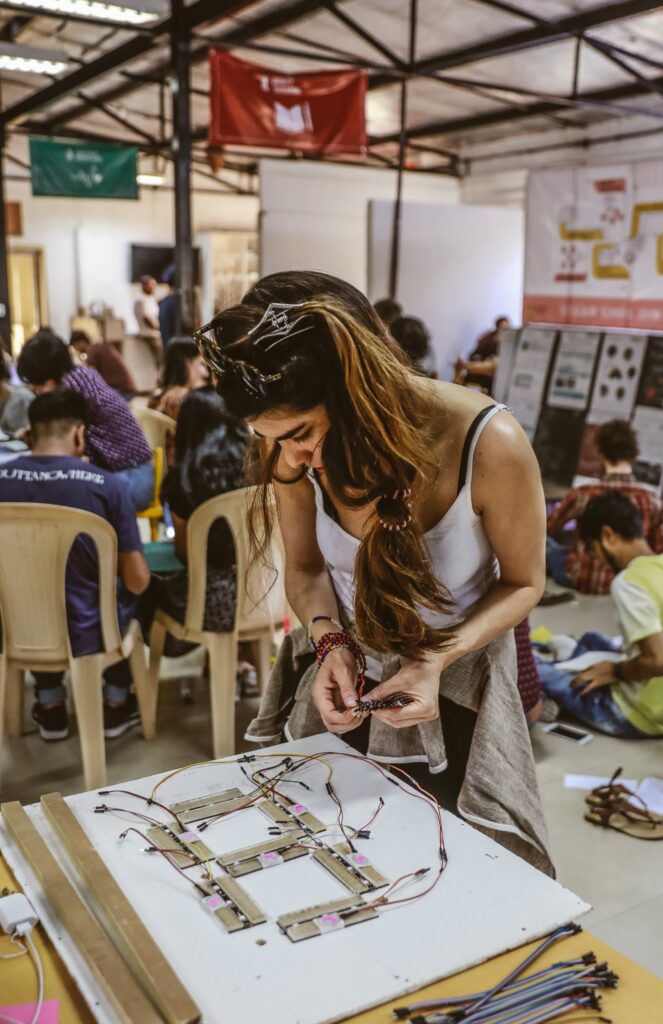
Her experiences encourage her to pass on her knowledge to others. During her time atthe Learning Planet Institute, she was also a member of the HOME student club. Along with three other student facilitators, Albin Salazar, Nefeli Paparisteidi, Nidhi Patel, and a Rwandan colleague, Yves Ininahazwe, she set up digital education workshops in fablabs in Kigali, Rwanda.
« Albin managed the automation part of the technology with Arduino, Yves handled all the digital technology, Nidhi worked on game design, and I taught human-centred design and design thinking« . At the University of Kigali, the HOME club students are working with Kigali’s digital tech K-LAB, FabLab Rwanda and the GIZ digital centre to run their workshops and courses for students over a two-week period.
Our aim was to share and exchange what we had been learning at the Learning Planet Institute to people in developing countries, and in Rwanda in particular, so that it could be of practical use, with relatively frugal technologies, and the Sustainable Development Goals as our backbone.
The programme is running smoothly, even if the workshop organisers have had to revise their initial expectations. « We took some knowledge for granted,, and some people didn’t really know the difference between technological solutions. So we had to reajust the content of our programmes – it wasn’t easy, but it was a great learning experience for us! » The methods, on the other hand, proved to be successful, and Maria Luisa and her colleagues from the club explained to the students how to create a web page, make a small robot with Arduino, or even an art installation.
The second year, during Covid, members of the HOME Club conduct the workshops online. « It was a lot more work to do it all online, but it worked. We invited speakers from UNESCO, professionals from various sectors and alumni from different countries. »
Today, the HOME Club has grown into an association, and the same project will take place in Senegal this year. For Maria Luisa, her two experiences with the University of Kigali have been very rewarding:
It’s a great satisfaction to be able to share our technical skills, to see people who have no experience in the field succeed in using digital tools, develop applications, learn how to build prototypes, contribute to the SDGs (Sustainable Development Goals) and be proud of that! I tell myself that this will be useful to them », she rejoices. « All we need now is to scale up these programmes so that they can be applied to as many people as possible, and to do that we need the support of universities and institutions. »
After completing her Master’s degree at the Learning Planet Institute, Maria Luisa worked in EdTech and then e-learning start-ups in Paris. She moved to Spain and is now in charge of innovation projects at the Festo Digital Hub in Barcelona. « I really enjoy what I do. I work on education and the gamification of processes rather than products. On a day-to-day basis, I’m the incubator coordinator and I gather together all the new ideas. I test these innovations and design them as a Minimum Viable Product (MVP). My experience with S.T.E.A.M School and HOME at the Learning Planet Institute have been formative.«
It was there that I learned techniques such as design thinking, which I use every day in my work.
One thing’s for sure: Maria Luisa’s passion for innovation and advancing education has just begun.
ABOUT THE S.T.E.A.M SCHOOL
The S.T.E.A.M School is a Franco-Indian programme born out of a collaboration between the Learning Planet Institute and an Indian markerspace called Maker’s Asylum. It brings together 100 Indian and French students from different backgrounds in markerspaces. A makerspace is a third-party digital production workshop, an evolution of the hackerspace, open to the public.
ABOUT EDTECH
Educational technology (EdTech) refers to all the new technologies that make teaching and learning easier1. These are educational technologies that enable new content to be learned in a fun, stimulating and innovative way.
Source: Wikipedia
LEARN MORE
👉 Find out more about the AIRE « Learning Sciences » Master’s degree
👉 Discover other portraits of members of our community
👉 Find out more about the HOME association
👉 Find out more about the Master AIRE « Learning Sciences » programme
This publication is part of the UNESCO Chair in the Science of Learning, established between UNESCO and Université Paris Cité, in partnership with the Learning Planet Institute. The ideas and opinions expressed in this publication are those of the authors. They do not necessarily represent the views of UNESCO and do not bind the organisation.
An original portrait written in French by Marie Ollivier
Thank you to Maria Luisa Serrano for answering our questions!
